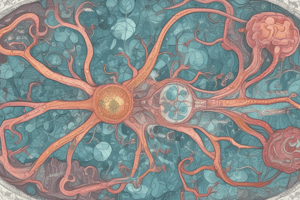Podcast
Questions and Answers
Which statement about receptors is accurate?
Which statement about receptors is accurate?
- Receptors for chemical messengers are lipids located in the endoplasmic reticulum.
- Receptors for chemical messengers are proteins or glycoproteins located inside the cell or in the plasma membrane. (correct)
- Receptors for chemical messengers are carbohydrates located in the cytoplasm.
- Receptors for chemical messengers are mainly composed of nucleic acids located inside the cell.
What happens when a chemical messenger binds to a receptor?
What happens when a chemical messenger binds to a receptor?
- It leads to the degradation of the receptor.
- It causes the receptor to move to the cytoplasm.
- It initiates one or more signal transduction pathways leading to the cell’s response. (correct)
- It deactivates the receptor and stops signal transduction pathways.
How do lipid-soluble messengers act upon binding to receptors?
How do lipid-soluble messengers act upon binding to receptors?
- They bind to receptors on the cell membrane and induce cell lysis.
- They bind to receptors inside the target cell and act in the nucleus as a transcription factor to alter the rate of transcription of specific genes. (correct)
- They bind to receptors inside the target cell and inhibit gene expression.
- They bind to receptors on the cell membrane and activate signal transduction pathways.
How are receptors regulated by their own messengers?
How are receptors regulated by their own messengers?
What is the significance of the specificity, saturation, and competition in receptor binding?
What is the significance of the specificity, saturation, and competition in receptor binding?
Flashcards are hidden until you start studying
Study Notes
Receptors and Chemical Messengers
- When a chemical messenger binds to a receptor, it triggers a response in the cell, often leading to a change in the cell's behavior or function.
- Receptors are specific, meaning they are designed to bind with specific chemical messengers, and this specificity is crucial for ensuring accurate cellular responses.
- Lipid-soluble messengers, such as steroids, can diffuse through the cell membrane and bind to receptors inside the cell, often regulating gene expression.
- Receptors can be regulated by their own messengers through a process called feedback inhibition, where the messenger binds to the receptor, reducing its activity and preventing excessive signaling.
- The binding of chemical messengers to receptors is influenced by factors such as specificity, saturation, and competition, which affect the strength and efficacy of the signal.
- Saturation occurs when all available receptors are bound to messengers, limiting the response.
- Competition occurs when multiple messengers bind to the same receptor, affecting the response.
- Understanding the specificity, saturation, and competition of receptor binding is crucial for understanding cellular signaling and response.
Studying That Suits You
Use AI to generate personalized quizzes and flashcards to suit your learning preferences.




